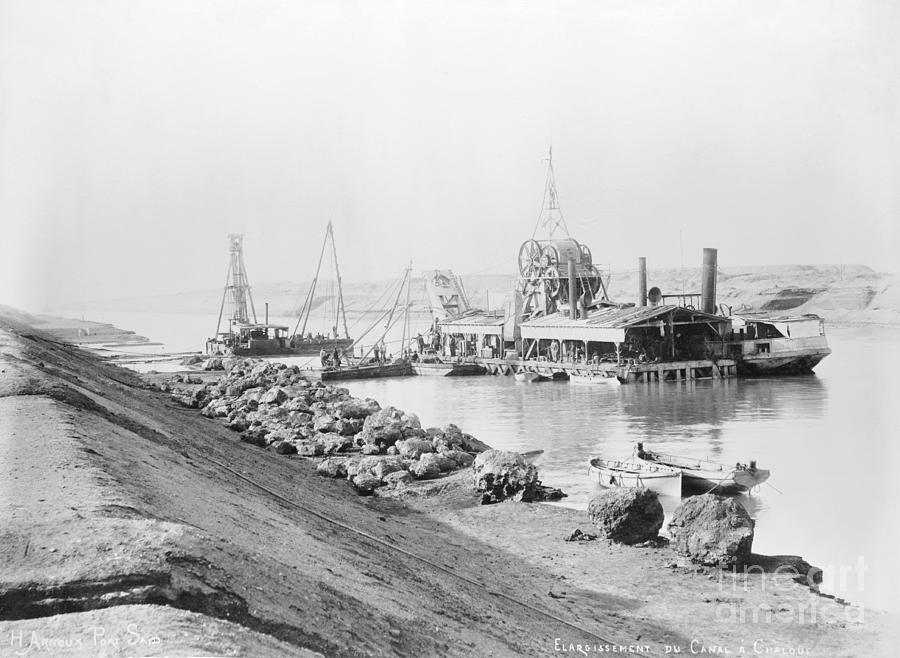1859
Construction begins on a canal across the Isthmus of Suez in Egypt to connect the Mediterranean Sea with the Red Sea. The ambitious engineering feat will take ten years to accomplish, and will forever change world trade.


Construction begins on a canal across the Isthmus of Suez in Egypt to connect the Mediterranean Sea with the Red Sea. The ambitious engineering feat will take ten years to accomplish, and will forever change world trade.

The telegraph line connecting Simon’s Town to Cape Town is declared opened. This is also the first electric line in South Africa.

South Africa is being electrified, and the Cape Argus newspaper reports, “Smoky old oil lamps for lighting the roads in the Rondebosch Municipality have been entirely replaced by electric incandescent lamps, much to the satisfaction of the residents of this (Cape Town) suburb.”

12 year-old Paul Panda Farnana, who will be considered the first Congolese intellectual, arrives in Brussels to begin his studies under the sponsorship of an official with Belgium’s colonial government in Congo, which he will criticise in the 1920s for failing to stop forced labour. He will become an agronomist, and be the first Congolese to receive a university diploma. After serving as a soldier for Belgium during World War I, when he will become a prisoner of war in Germany, he will begin his political activism advocating for fellow African war veterans when he forms the Union Congolaise. Alarmed by his activism, the Belgian government will ban Congolese from studying in Belgium.

The town of Wankie (Hwange) is less isolated in northwest Southern Rhodesia (Zimbabwe) when it is connected today by railway line to the new bridge under construction on the Zambezi River.

The United Nations Conference on International Organization opens in San Francisco in the U.S. with 45 nations meeting to set up the U.N. African nations in attendance are Egypt, Ethiopia and Liberia. South Africa is present, but as part of the U.K. delegation.

France detonates another atomic bomb at Reggane Oasis in Algeria. A French colony, Algeria is one year away from national independence, and Algerians have little ability to stop the ongoing nuclear testing on their soil.

The British flag is lowered over the British Protectorate of Swaziland (Eswatini), and the new Swaziland flag is raised for the first time. This is a step toward national independence in 1968. The Swazi monarchy’s rule over the country is restored.

The Carnation Revolution topples Portugal’s authoritarian regime. The new government commences talks with the liberation movements of Portugal’s African colonies Angola (pic: Luanda), Cape Verde, Guinea-Bissau and Mozambique. All these colonies will achieve their national independence within a year.

The U.S. enacts the Clean Diamond Trade Act to implement the Kimberley Act, to ensure that no “Conflict Diamonds” are illegally mined and smuggled out of Central Africa and enter the diamond market of the U.S. Sometimes known as Blood Diamonds, profits from these finance insurgencies and terror groups.

Ethiopia’s cultural treasure, the Obelisk of Axum, is returned to the country after being airlifted in pieces from Italy. The obelisk was stolen by the army of Italian dictator Benito Mussolini in 1937.

With winds of 220km/hr, Cyclone Kenneth hits Mozambique, killing 28 people and causing extensive flooding.


Beninese intellectual, doctor and anti-colonialism activist, in Porto-Novo, Dahomey. Returning to Dahomey (Benin) at age 35, after being sent away as a boy to France, where he earned law and medical degrees, he witnessed the ill-effects of French colonialism. He criticised France’s African presence upon his return to Paris. The French government declared him a subversive, and he was compelled to leave the luxury life of a celebrity intellectual and return to Dahomey. Seeking someone to blame for an uprising in Dakar in the 1930s, French authorities arrested Houénou, who died of typhoid fever in prison in 1936.

Zanzibari author and journalist, in Makunduchi, Zanzibar. The introduction of a detective lead character in his first novel in 1958, the award-winning Mzimu wa Watu wa Kale (Shrine of the Ancestors), brought Swahili literature out of its folklore tradition and into popular contemporary fiction, and earned him the name “the father of popular Swahili fiction.”

Namibian runner and Africa’s fastest blind sprinter, in Okankolo, Namibia. He lost one eye at age three when he was accidentally hit by an arrow shot by his brother, who was aiming at a bird. He lost his other eye at age six when he was working in a field and was kicked by a donkey. Competing in the T11 (totally blind) category at the 2016 Paralympic Games, he became the first Namibian man to win an Olympic gold medal, while also setting a Paralympic record for the 200m.